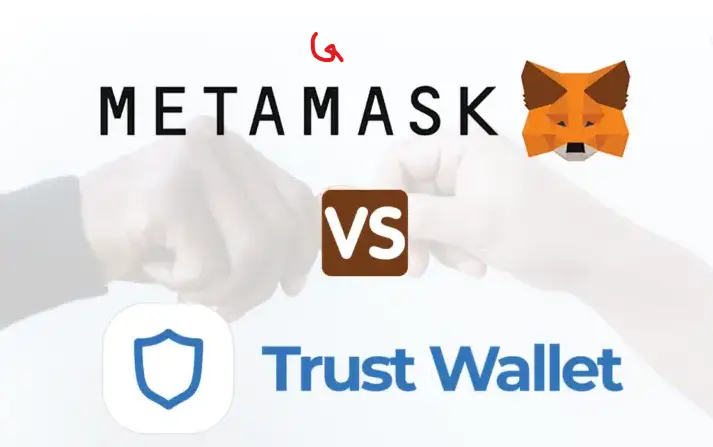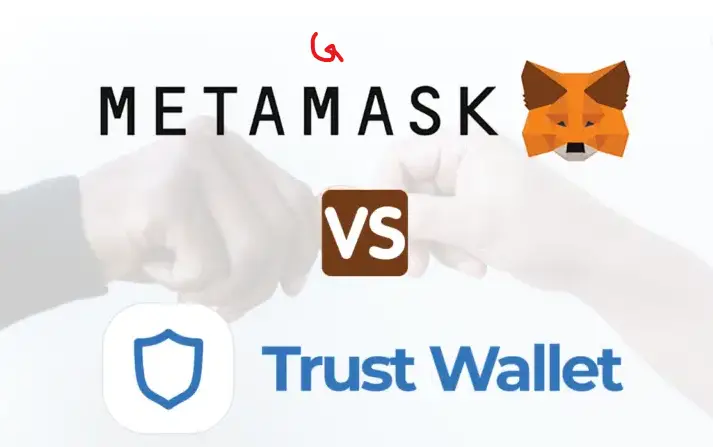Best Way to Compare METAMASK VS TRUST WALLET: WHICH OF THESE CRYPTO WALLETS IS BETTER?
Because they perform very similar services, comparing Metamask vs Trust Wallet and selecting the best one from the two can be difficult. They are the two most popular Web3 crypto wallets, allowing users to store, send, receive, and manage their digital assets while also allowing them to access the decentralized web.

Both Metamask and Trust wallet enable a wide range of digital assets and blockchain networks, but as this article will demonstrate, they differ in important respects.
MAIN FEATURES OF METAMASK
Metamask, founded in 2016 by ConsenSys, is the most popular Ethereum-based crypto wallet that provides simple custody and management services for digital assets. In 2019, the platform released its mobile wallet version in an effort to empower users with simplified ways to manage their assets and interact with decentralized finance (DeFi) as easy as browsing the internet.
Supported Cryptocurrencies
Ether (ETH), USD Coin (USDC), Tether (USDT), Polygon (MATIC), Binance Coin (BNB), Immutable X (IMX), and other Ethereum-based or ERC-20-compatible tokens are supported by the Metamask wallet. Other crypto coins based on the Ethereum layer-2 blockchain networks are also supported.
Supported Networks
It supports the Ethereum blockchain network as well as other networks compatible with the Ethereum Virtual Machine (EVM), such as the Binance Smart Chain, Polygon, Optimism, and Avalanche.
security
When withdrawing funds from the wallet, Metamask provides additional layers of security such as touch ID, face ID, and a password to help users to secure more security over their assets. These forms of identification will be required for any outgoing transaction. This is in addition to the private keys that users must maintain safe.
Supported Platforms
This wallet is available as an in-browser program for desktop or laptop computers, as well as a mobile app on Google Play and the Apple program Store. Metamask works with a variety of Ethereum-compatible systems, including OpenSea, Uniswap, QuickSwap, and PancakeSwap.
Services Offered
The Ethereum wallet provides a variety of services, including the purchase, sale, and exchange of cryptocurrency tokens. Furthermore, it allows users to lock up (stake) their tokens in certain pools to collect dividends. Metamask’s in-built browser also allows for quick access to the DeFi world.
Anonymity
The anonymity of users is prioritized by MetaMask. It does not necessitate information such as the “Know Your Customer” (KYC) processes required by cryptocurrency exchanges. This means you only need one password to use all of Metamask’s services.
MAIN FEATURES OF TRUST WALLET
Trust Wallet is a non-custodial cryptocurrency wallet that allows users to transfer, receive, swap, and store cryptocurrencies as well as non-fungible tokens. (NFTs). It supports many blockchain networks and is available on Android, iOS, and browser extensions.
Trust Wallet was launched in November 2017 by Viktor Radchenko. However, Binance purchased the wallet eight months later, in July 2018, in order to provide greater service and crypto security to its consumers.
Supported Cryptocurrencies
Trust Wallet accepts Bitcoin (BTC) as well as over 4.5 million currencies and tokens from 64 different blockchain networks. Ethereum (ETH), Solana (SOL), BNB Chain (BNB), Polygon (MATIC), Aptos (APT), Avalanche (AVAX), and its own currency, Trust Wallet currency, are some examples. (TWT).
Supported Networks
In contrast to the Metamask wallet, which only accepts cryptocurrencies that are compatible with the EVM, the wallet supports a wide range of networks, including Solana, Cardano, Tron, and over 60 more blockchains.
Security
Trust Wallet is safe as long as users remember to keep their private keys, also known as recovery phrases, safe and organized. No reports of vulnerabilities have been substantiated thus far. Touch ID, passwords, Face ID, and two-factor authentication are also used to increase the security of the user’s crypto assets.
Supported Platforms
It supports a number of decentralized apps (DApps) and platforms established on the blockchains to which it has access. Decentralized exchanges, NFT markets, and decentralized apps are examples of these.
Services Offered
Trust Wallet is much more than a wallet for storing virtual currencies. Well-known decentralized applications (DApps) such as PancakeSwap, UniSwap, 1inch, Aave, and others may be easily used on over 60 blockchains, including Ethereum, Solana, Binance Smart Chain, and Polygon. Users can now swap funds straight from their wallets and withdraw funds directly from the Binance exchange.
Anonymity
The Trust wallet, being a non-custodial wallet, allows users world wild to keep their private keys. It does not, however, demand any personal information, such as photographs or identification cards. It functions similarly to Metamask in that it secures users’ assets with a secret phrase and password without requiring KYC.
WHICH IS THE SAFEST WALLET, METAMASK, OR TRUST WALLET?
We can’t definitively pronounce one to be “the safest” when comparing Metamask vs Trust Wallet because they’re both popular and well-regarded.
The level of security of a crypto wallet is determined by criteria such as the security mechanisms employed to protect private keys, the encryption algorithms utilized, and the reputation and track record of the specific wallet provider throughout time.
Both Metamask and Trust Wallet prioritize security and provide comprehensive measures to protect users’ assets, such as strong encryption and the usage of 2-factor authentication techniques like touch or face ID.

Metamask, for example, encrypts and maintains private keys on the user’s device, and users can combine Metamask with a hardware wallet for increased protection.
Trust Wallet, on the other hand, is compatible with a wide spectrum of cryptocurrencies. It employs robust encryption and supports hardware wallets as well as biometric identification methods such as fingerprint and facial recognition.
As a result, you must also manage the security of your cryptocurrency wallet by safeguarding your private keys and preventing phishing schemes. In the meanwhile, you can choose a bitcoin wallet depending on the fees and other features that are important to you.